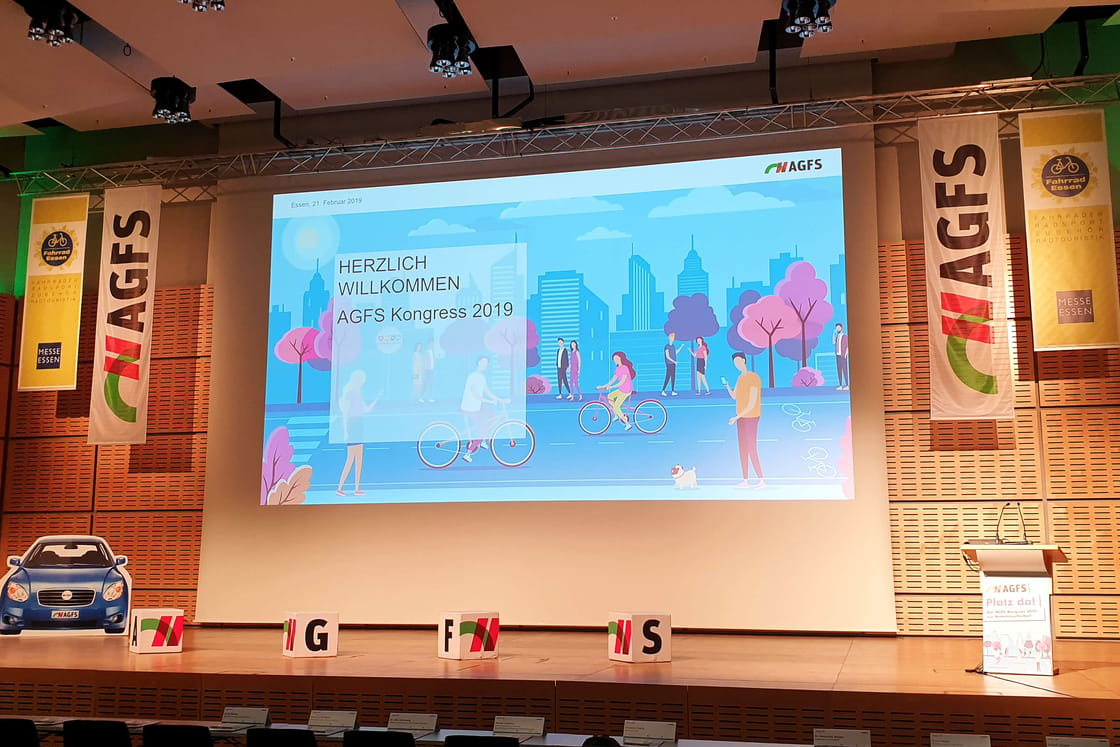AGFS Congress 2019 with new record attendance
The Arbeitsgemeinschaft fußgänger- und fahrradfreundlicher Städte, Gemeinden und Kreise in Nordrhein-Westfalen e. V. (AGFS) (Working Group of Pedestrian- and Bicycle-Friendly Cities, Municipalities and Districts in North Rhine-Westphalia) addressed the topic of road safety at its congress this year, which took place on February 21, parallel to the public bicycle exhibition, at the Messezentrum Essen. Around 700 participants, more than at previous congresses, discussed with experts from politics, administration and research a modern traffic infrastructure that ensures more safety, especially for local mobility, and discussed the legal framework needed for this, such as an adjustment of the road traffic regulations.
A question of money
“Strengthen the municipalities!”, Frank Meyer, Mayor of the City of Krefeld and Chairman of the AGFS Presidium, addressed this appeal to the federal government and the state right at the beginning. Only through further financial support, he said, would cities and municipalities be able to create infrastructures for a transport policy that would increase traffic safety and enable Germany to achieve its climate targets. There were blanket commitments to this from the representatives of the state and the BMVI. Safety is a key prerequisite for switching to a bike, he said. This year, the state is spending a total of 2.25 million euros more than last year on promoting bicycle- and pedestrian-friendly local mobility, explained Dr. Dirk Günnewig, head of the Department of Basic Mobility, Digitization and Networking at the State Ministry of Transport. On behalf of the federal government, Karola Lambeck, cycling commissioner at the Federal Ministry of Transport and Digital Infrastructure (BMVI), was particularly committed to the further expansion of cycling expressways, pointing to the review of the road traffic regulations for greater local traffic friendliness, which is currently underway.
Space for safety
In the opinion of an expert from the German Insurers Accident Research, the measures taken to date have not led to any significant increase in the safety of local mobility. According to the insurers’ analysis, most accidents involving personal injury still occur at intersections and crossings – the reason for this being a lack of visibility, for example due to parked cars and trucks. Excessive speed and lack of roadworthiness were other factors contributing to accidents, he said. Safety for pedestrians and cyclists needs more space than both are currently given in road traffic.
Perceive safety
Research conducted by the Technical University of Braunschweig on the influence of infrastructure on the overtaking behavior of drivers shows that appearances can also be deceptive when it comes to road safety. The astonishing result: missing markings tempt drivers to keep the legally required minimum distance of 1.5 m more often.
According to Tilman Bracher of the German Institute of Urban Affairs, a contemporary road traffic code is currently in urgent demand. According to the traffic expert, § 45 StVO (“traffic-restricting measures”) and, in particular, case law continue to anchor the privileging of motor traffic. This must be changed with a cleverly amended StVO before an “umbrella law” for road traffic planning can be implemented.
The subjective perception of safety also played a role in Essen: pedestrians and cyclists feel increasingly harassed by motorized vehicles, and the relationship between pedestrians and cyclists is also often not characterized by consideration.
The road safety campaign “Love needs distance” presented at the congress aims to change this and to this end addresses the frequently problematic distance behavior between unequal road users. It is being carried out cooperatively by the AGFS, the Zukunftsnetz Mobilität NRW and the Landesverkehrswacht NRW and is being financed and supported by the Ministry of Transport of the State of North Rhine-Westphalia.
